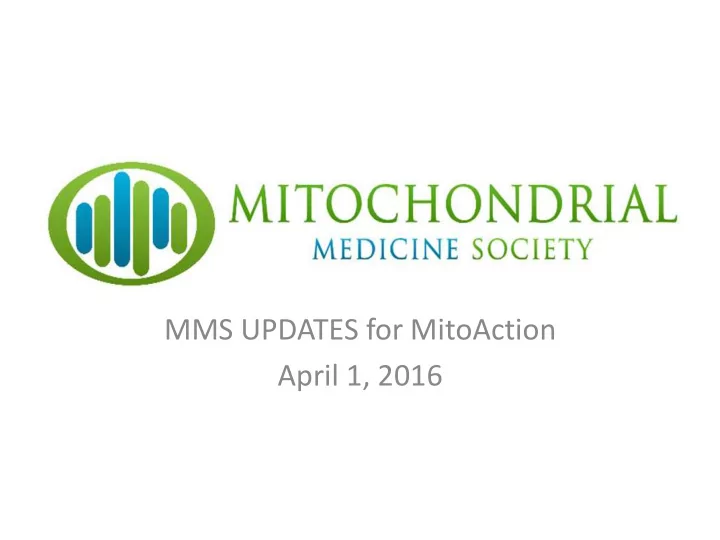

MMS UPDATES for MitoAction April 1, 2016
New Projects 1) Solid Organ Transplantation: spearheaded by Dr Parikh 2) Stroke protocol for MELAS publication: spearheaded by Dr Koenig 3) Standards of Care for Mitochondrial Disease Patients 4) Centers of Excellence
Solid Organ Transplantation • Poster being presented by Dr Parikh at SIMD 2016 • 35 patients, 17 mito centers, 4 countries (US, Canada, UK, Australia) receiving heart, liver or kidney transplant • Half the patients had transplant before diagnosis was known • Overall survival was similar to those in transplant literature with exception of POLG-related disorders and liver transplant
Review | March 07, 2016 Recommendations for the Management of Strokelike Episodes in Patients With Mitochondrial Encephalomyopathy, Lactic Acidosis, and Strokelike Episodes ONLINE FIRST Mary Kay Koenig, MD 1 ; Lisa Emrick, MD 2 ; Amel Karaa, MD 3 ; Mark Korson, MD 4 ; Fernando Scaglia, MD 5 ; Sumit Parikh, MD 6 ; Amy Goldstein, MD 7 JAMA Neurol . Published online March 07, 2016. doi:10.1001/jamaneurol.2015.5072
Preventative Care Screening Guidelines 1. Anesthesia 2. Audiology 3. Cardiac 4. Critical Illness 5. Endocrine 6. GI 7. Hematologic 8. Immunologic 9. – 12. Neurologic 1 – 4 (development, headaches, stroke, spasticity, seizures) 13. Ophthalmologic 14. Orthopedic 15. Pregnancy 16. Psychiatric 17. Pulmonology/Respiratory 18. Renal, Acid/Base, Electrolytes 19. Surgery precautions 20. Constitutional (Fatigue, Pain)
Preventative Care Screening Guidelines Subjects 1. Anesthesia (no subgroup needed; work completed) a. Will include recommendations from Consensus Statement (Genetics in Medicine Dec 2014) 2. Audiology a. SNHL b. Cochlear implants 3. Cardiac a. Cardiomyopathy b. Dysrhythmias c. Pacer placement (especially for Pearson/KSS) d. Hypertension e. Chest pain
4. Critical Illness a. Endocrine worsening (especially adrenal insufficiency) b. Acid/base status c. Worsening RTA d. Dysrhythmia e. Respiratory issues related to weakness f. Other? 5. Endocrine a. Thyroid b. PTH/Ca/Vit D c. Adrenal d. Diabetes e. Short stature/GH deficiency f. Bone density (related to disuse/non-ambulatory status 6. GI a. Liver disease b. Constipation c. Motility d. Nutrition e. FTT
7. Hematologic a. Anemia b. Bone marrow failure 8. Immunologic 9. Neurologic 1 a. Epilepsy* b. Headache/Migraine c. Movement DO 10. Neuro 2 a. Myopathy b. Neuropathy* c. Tone d. Spasticity e. Dystonia 11. Neuro 3 a. Developmental Delays b. Learning Disabilities 12. Neuro 4 a. Stroke – refer to published guideline 13. Ophthalmologic * a. Retinal and optic nerve disease b. Ptosis c. Ophthalmoplegia
14. Orthopedic a. Scoliosis 15. Pregnancy * 16. Psychiatric a. Depression b. Anxiety c. Personality disorder 17. Pulmonology/Respiratory * a. Central and obstructive apnea b. Respiratory insufficiency c. Sleep (include central/CNS related issues) 18. Renal, Acid/Base, Electrolytes a. Acidosis b. RTA c. Glomerulonephritis 19. Surgery precautions (no subgroup needed; work completed) a. Refer to consensus statement 20. Constitutional a. Fatigue b. Pain c. Weight management d. High altitude travel
Creating Mitochondrial Centers of Excellence 1) Focus groups of patients, families, caregivers 2) Input from Support Groups (MitoAction, UMDF, LHON) 3) Creation of Surveys for further data collection 4) Distribution of Surveys and Data Collection 5) Create checklist of COE requirements 6) Checklist questionnaires collected from potential COE 7) Governing Board to check COE is following Standards of Care and fulfilling requirements We will be seeking out the community’s help to establish what a Mitochondrial COE should look like; stayed tuned!
* *Development of Patient registry, CF Centers of Excellence and Standardized Care help improve overall morbidity and mortality for CF patients ; addition of standardized treatments at every center that are: Simple, Cheap, Pre-exist, and Non-pharmacological
Recommend
More recommend